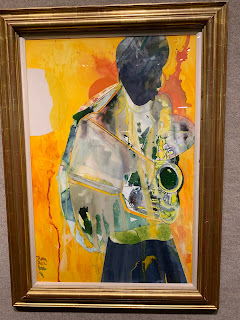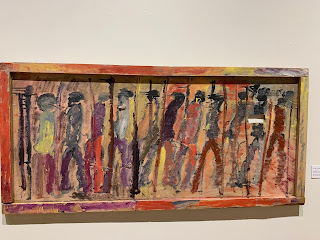I have spent a fair amount of time in Deland during my residence in Florida but had not seen hide nor hair of a museum there. I found that it is housed in a relatively new building on the Stetson Campus; I should have known.
The museum was not very busy at that time of the morning. It was staffed by well-dressed, eager volunteers who were chomping at the bit to show off this facility of which they were so obviously proud.
We checked in at the reception desk where the layout of the feature exhibit was explained. The exhibition was titled Masterpieces of African American Art and featured more that 85 pieces drawn from two significant collections: (i) African American Art: We Too Dream America and (ii) a selection from the museum's permanent collection titled Purvis Young: Overtown's Visual Poet. We climbed to the top floor to begin our exploration of the first collection.
African American Art: We Too Dream America
This curation is broad, utilizing a variety of artists, styles, media, expressions and topics to show that African American art is not hemmed in or stereotypical. Like non-African American artists -- and even though straitened by their times and experiences -- African American artists can still capture and relay a broad array of Americana, both within and without their lived experiences.
Two of the works that jumped out at me immediately were Jazz Stories ... and Tar Beach #2. Faith Ringgold is an artist, educator, sculptor, and children's book author and illustrator who has doggedly pursued her career; and has the accolades and awards to prove it. She was born in Harlem during the Renaissance period and graduated from City College with Bachelors and Masters degrees in Art. She taught in the New York City School System and at the collegiate level all while pursuing her own personal art efforts. She has painted traditionally, produced sculptures, produced portraits of famous people, and produced quilts, some of her best received works of art. She is also a Children's Book author and illustrator and won the Caldecott Book Award for Tar Beach in 1992.
Faith has over 30 quilts to her credit. They are mostly written in the form of children's stories wherein each part of the quilt is a page.
 |
| Faith Ringgold Jazz Stories: Mama Can Sing, Papa Can Blow #1: Somebody Stole my Broken Heart, 2004 |
 |
| Faith Ringgold Tar Beach #2 1990 - 1992 |
In the two quilts above we see the dichotomy of Faith's work. Tar Beach #2 is definitely child-like with panel-based story telling while Jazz Stories is all about the visual and appears to be targeted at an adult audience.
 |
| Augusta Savaga The Harp (Lift Every Voice and Sing) circa 1939 |
Augusta Savage was a black sculptor and educator working out of Harlem during the time of the Renaissance. She endured many hardships and disappointments in pursuit of her goals but was eventually rewarded with a commission to produce a piece to be exhibited at the 1939 World's Fair. The piece that she produced was a 16-foot-tall plaster sculpture that was inspired by the James Weldon and Rosamund Johnson classic Lift Every Voice and Sing.
The sculpture depicted a group of twelve stylized black singers in graduated heights that symbolized the strings of a harp. The sounding board was formed by the hand and arm of God, and a kneeling man holding music represented the foot pedal.The Harp was exhibited in the court of the Contemporary Arts building and received much acclaim. Unfortunately, Augusta could not raise the funds to have the sculpture cast in bronze so it was destroyed at the end of the fair. A number of small replicas -- like the above -- exist.
 |
| Ms. Savage working on The Harp |
Aaron Douglas was a leading player in the Harlem Renaissance with his home being a major gathering point for the likes of Langston Hughes and W. E. du Bois. Aaron's Mr Bill is a much more refined and less hairy version of The Beggar from the Louis Dewis exhibition now showing at the the Orlando Museum of Art. It is somewhat reminiscent of the Berthe Morrisot style in that the face is well defined while the clothing is less so. There is a lot of empty space on the right side of the work and the subject is not looking out at the viewer. Beautiful palette of colors in the open space. Combination portraiture and abstract art. Almost sculpted hairline.
 |
| Aaron Douglas Mr. Bill c. 1940s |
Selected other pieces from the African American Art selection are shown below:
 |
| Romare Bearden All the Things You Are 1987 |
 |
| Jacob Lawrence Builders #1 1972 |
 |
| Benny Andrews Untitled (Woman in a Yellow Dress Under a Tree) circa 1958 - 62 |
 |
| Robert S. Duncanson Waterfall Undated |
 |
| Richmond Barthé Stevedore Undated |
 |
| Herbert Gentry Handshake 1991 |
 |
| Mary Lovelace O'Neal The Mother of the Twins Carries a Gun 1994 |
 |
| Richard Yarde Red Dress 1989 |
 |
| Ronald Joseph Home - Paris 1951 |
Selected Pieces from Purvis Young: Overtown's Visual Poet
Purvis Young returned to Overton, a formerly thriving Black literary and cultural enclave in Miami, from a stint in prison for breaking and entering. Overton had been reduced to "a few square blocks of decay, despair, and devastation" and it is this place, and its people, that serve as the inspiration for Purvis' works.
Purvis began his effort by painting on any available material -- pieces of cardboard, pieces of wood, discarded books -- and then hanging the completed works on abandoned buildings in Good Bread Alley. His works came to the attention of collectors to include the Rubell family who, at one point, bought the entire contents of his studio and donated the more than 3000 pieces to museums around the country.
Mr Young was a prolific artist who constantly battted away recommendations that he should paint less in order to positively impact the value of his works. A selection of his works currently in the Deland Museum's permanent collection is shown below.
 |
| Purvis Young Procession circa 1995 |
 |
| Purvis Young Figure Study circa 1995 |
 |
| Purvis Young Overtown Landscape |
*******************************************************************************************************************
I enjoyed this exhibition. The museum is uncrowded so one can examine the pieces at one's own pace. The one area in which I felt a void was in the information provided, both about the broader themes and on individual pieces.
This was great for Deland and should be visited as soon as possible as the exhibition ends March 17th.
©Everythingelse238








Thank you for visiting the Museum. We have new exhibitions opening about every two months. The next exhibitions open March 29th and April 5th.
ReplyDeleteThank you. I look forward to visiting you again then.
Delete